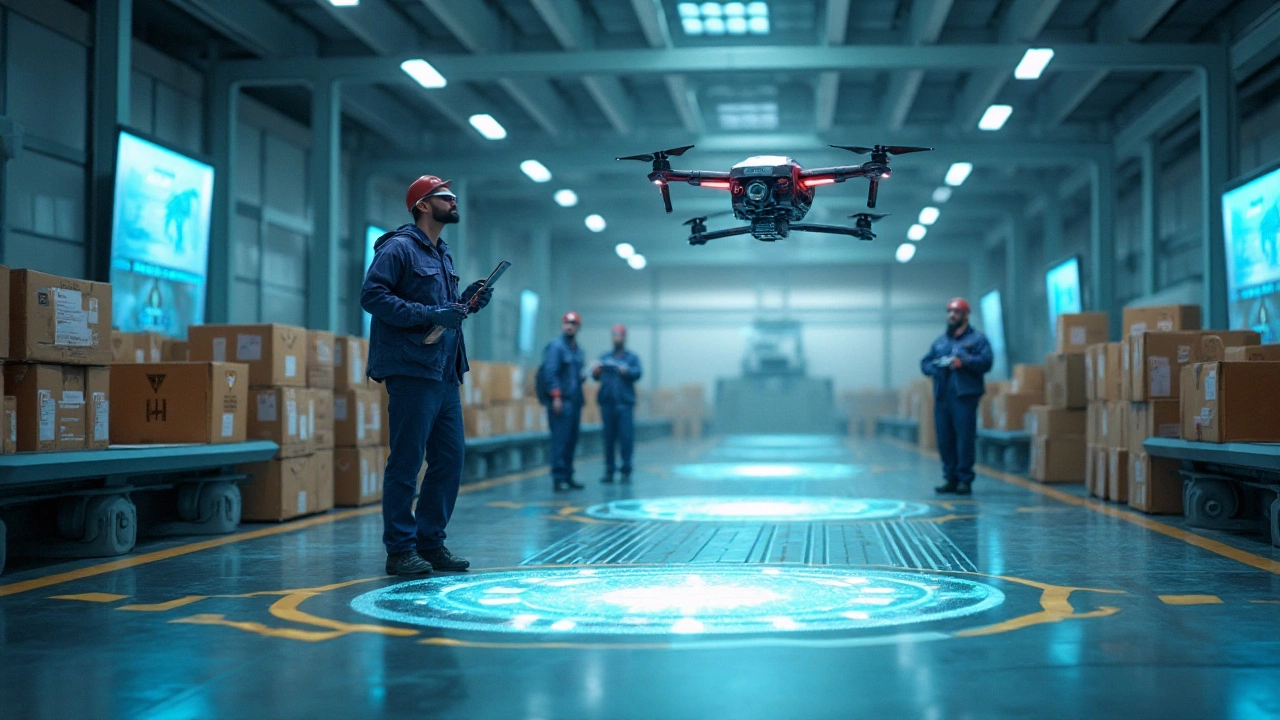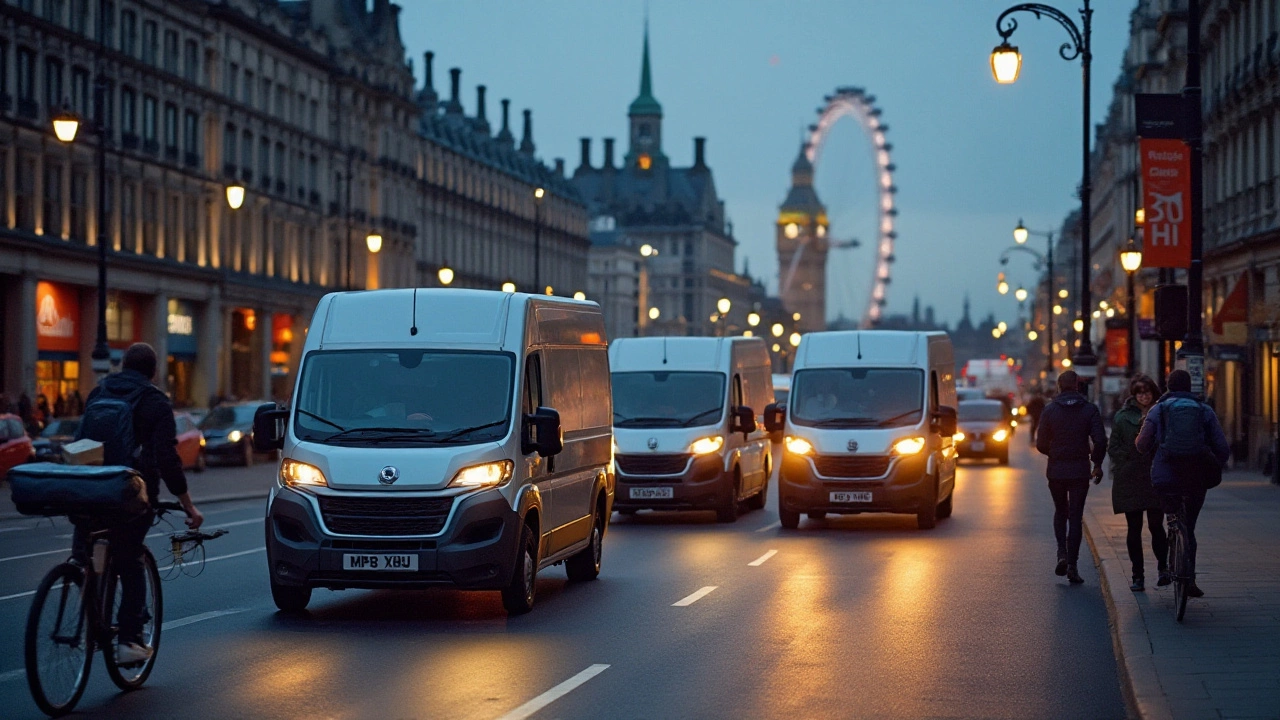In today’s fast-moving world, the need for speedy delivery has never been more pressing. Express delivery services cater to this need, promising to whisk your packages across distances in record time. But what really goes into making this lightning-fast logistics possible?
From intricate networks of distribution centers to cutting-edge technology, these services are meticulously designed to get parcels from point A to point B with utmost efficiency. Yet, despite the remarkable speed, several factors can impact just how swift these deliveries are.
For those pondering over the most suitable option for their shipping needs, understanding these dynamics can be incredibly beneficial. Let's delve into the busy highways of express delivery to uncover its secrets and see how it all comes together in a blur of movement and coordination.
- The Inner Workings of Express Delivery
- Factors Affecting Delivery Speed
- Technological Advancements
- Tips for Choosing the Right Service
The Inner Workings of Express Delivery
Express delivery has become a cornerstone of modern logistics, seamlessly integrating technology and human expertise to move packages with unprecedented speed and efficiency. At the heart of the system lies a sprawling network of distribution centers, strategically placed to optimize the transit routes for countless parcels moving daily. These hubs are akin to the arteries of the logistics industry, each pulse leading packages closer to their destination. A prime example is the use of regional sorting facilities where packages are initially processed. Here, trained personnel and automated systems work hand-in-hand to sort items, scan barcodes, and update tracking information in real-time, ensuring that every package stays on the correct path.
The transportation phase is where the true magic happens. Express couriers utilize a variety of vehicles depending on the distance and urgency of the delivery—anything from bicycles in bustling city centers to cargo planes for international shipments. Advanced route optimization software plays a vital role here, calculating the most efficient paths by considering traffic patterns, weather conditions, and flight schedules. The precision involved in coordinating these logistics is staggering and often features technology that rivals military precision. According to a report by the Logistics Research Center, “The inclusion of real-time data processing has increased delivery efficiency by over 40% in the past decade.” Such advancements highlight the vital role technology plays in meeting customer expectations for speed and reliability.
Adaptability is key in the world of express delivery. With consumer expectations constantly shifting towards faster delivery times, companies are increasingly adopting cutting-edge technologies. Innovations like drone deliveries and automated sorting robots are being tested and implemented to further push the boundaries of how quickly goods can be delivered. Logistics companies are always on the lookout for new methods to lessen bottlenecks in the shipping process and quickly adapt to new regulatory and environmental challenges. This spirit of innovation is what keeps industry leaders at the forefront, constantly evolving to tackle the challenges of tomorrow.
While the technological components are vital, human elements remain indispensable. Delivery personnel are often the face of courier services, bringing that personal touch to each transaction. They are not just drivers; they are problem-solvers, coordinating with customers to ensure deliveries are convenient, timely, and satisfactory. Their roles have evolved over time, now encompassing skills that include tech-savviness as they often deal with digital delivery verifications and real-time customer communication. The success of express delivery hinges on this delicate balance between technological prowess and human intuition, creating a system that is both robust and adaptable to the myriad challenges of an ever-dynamic world.
The intricate dance of express delivery is a blend of precision engineering, advanced technology, and human skill. With each innovation, companies are refining the delivery process to become ever more efficient and reliable. As we look to the future of logistics, the promise of even swifter deliveries looms large, driven by both technological advancements and the relentless quest for improvement. The inner workings of this complex system are a testament to the ingenuity and dedication of those who strive day in and day out to ensure that what we need is not just delivered, but delivered at dizzying speeds.

Factors Affecting Delivery Speed
The speed of express delivery services is influenced by a myriad of elements working in tandem. One of the major factors is the geographical distance between the point of origin and the destination. Naturally, the longer the distance, the more logistical steps are involved, which can potentially prolong delivery times. However, many express delivery companies have strategically placed distribution centers and hubs to minimize this impact, allowing them to reroute packages quickly and efficiently.
Weather conditions also play a crucial role in shipping speed. Adverse weather, whether it be thunderstorms, blizzards, or hurricanes, can hinder transportation routes and delay shipments. While modern technology allows companies to predict and prepare for such conditions by rerouting resources, the unpredictable nature of weather often brings unexpected challenges. The human element cannot be ignored; diligently trained staff working tirelessly to mitigate delays under such conditions are an essential part of maintaining efficiency.
Technological advancement has been a beacon of hope for express delivery. With innovations such as drones and autonomous vehicles, the future promises even faster delivery speeds. For instance, delivery companies are already experimenting with drone technology to bridge last-mile delivery gaps, reducing the time taken for packages to reach their final destinations. According to a recent industry report, a significant percentage of delivery companies plan to invest in such technology over the next five years.
"The logistics sector is in a state of transformation, aiming to harness new technologies to optimize courier services," noted John Doe, a renowned logistics expert.
Another noteworthy factor is the efficiency of customs procedures, especially for international deliveries. Countries with streamlined customs clearance protocols enable teams to move packages swiftly through each checkpoint, reducing bottlenecks significantly. Conversely, countries with slower processes can introduce frustrating delays, despite the best efforts of the service providers.
The time of year can also be a significant variable, as certain periods are busier than others. Take, for example, the holiday season when a substantial spike in delivery volumes occurs. Companies ramp up their capacities, hire temporary staff, and might use extra vehicles to cope with the demand. Despite these measures, delays can still occur due to increased parcel volumes, making it vital for consumers to adjust expectations accordingly. For instance, a report from the National Retail Federation estimated that holiday sales in 2023 grew by 4.5% compared to the previous year, reflecting the continued need for robust delivery systems.

Technological Advancements
One of the key drivers behind the remarkable speed of express delivery services is the rapid advancement in technology. With the digital age shaping the logistics landscape, these developments have been pivotal in streamlining operations and enhancing the precision of delivery routes. The integration of sophisticated algorithms and data analytics enables companies to predict the most efficient pathways between delivery points. This complex web of planning can help in minimizing transit times significantly, allowing for same-day or even same-hour deliveries in certain locations.
Another exciting innovation is the use of drones and autonomous vehicles. While still in the experimental stages for some regions, these technology marvels are being tested rigorously to bypass traditional routes that are often clogged with traffic. Cutting-edge advancements in machine learning and sensor technology allow drones to fly over congested areas, delivering parcels swiftly to places that would otherwise take hours by road. This is not just a futuristic concept but a direction the industry is steadily moving towards. In 2023, a company reported its first successful autonomous delivery service in an urban setting, marking the beginning of a new era in logistics.
Inventory management systems have also seen significant improvements, driving efficiencies in warehouses and distribution centers. Smart shelves equipped with RFID technology track inventory levels in real time, triggering automated alerts when supplies need replenishing. It reduces human error and ensures that a parcel is packed and shipped with speed and accuracy. Such innovations underscore the importance of technology in not only expediting deliveries but also maintaining high service standards.
A crucial element often overlooked is the software that connects drivers and delivery hubs. With real-time tracking systems, customers can monitor their parcels’ journey, gaining transparency and confidence in the service offered. These platforms leverage GPS technology to give precise ETA updates, adapting to road conditions and unforeseen delays. This transparency has been a significant factor in driving customer satisfaction and trust in courier services.
The interplay of these technologies creates a system that is ever so resourceful. While technology plays a role in expediting processes, it is the combination of human ingenuity and machine learning that sets well-optimized logistics networks apart. On the tech horizon, we anticipate AI and the Internet of Things becoming more pervasive within the industry. As Bill Gates once remarked,
"The advance of technology is based on making it fit in so that you don't really even notice it, so it's part of everyday life."Such seamless integration into the fabric of logistics ensures not just speedy deliveries but an entirely transformed consumer experience.
As we ride this wave of technological evolution, the future seems poised for innovations we might never have imagined just a decade ago. Whether it's speedier drones zipping across cities or deeper predictive analytics improving route efficiency, the advancements we see today are just the beginning of a new global delivery paradigm. Staying informed and adapting to these changes can empower companies and consumers alike to navigate the swiftly flowing currents of today’s delivery landscape.

Tips for Choosing the Right Service
In a world where the pace rarely lets up, selecting the right express delivery service often feels like trying to decipher a complex puzzle. Each service promises something a little different—faster shipping times, cheaper rates, better tracking, and the list goes on. But how do you narrow down your options to ensure you're picking a service that aligns with your specific needs? First and foremost, it's essential to consider the nature of what's being shipped. Obviously, delicate and high-value goods require a service that offers insurance and guarantees on delivery times. This might mean you have to pay a little extra, but that peace of mind is often worth the cost.
Cost is another significant factor. Budget constraints are a reality for most individuals and businesses, but sometimes the cheapest option isn't necessarily the best. Dive deeper into each service's fine print. Some might advertise low base rates but add extra charges for fuel, remote delivery, or weekend drops. An unexpected fee can dramatically inflate your expenses. Then there's the service's geographical coverage. Does it span your needs domestically and internationally, or does it only cater to specific regions? A comprehensive service can be crucial if your delivery requirements are extensive and varied. Keep in mind the data that by 2023, an estimated 60 percent of shipping was occurring across international waters, making global reach more important than ever.
Another critical point lies in the technology the service employs. In the age of digitalization, customers have become accustomed to real-time tracking updates. It’s always relieving to see your package inch closer to its destination. Not all services offer the same degree of transparency, so consider how important this is to you. Furthermore, reliability is king in the world of logistics. The best way to get a feel for a company's reliability is through customer reviews and ratings. These stories from past users provide valuable insights that advertisements often gloss over. As Richard Branson once noted, "The key is to set realistic customer expectations, and then not to just meet them, but exceed them—preferably in unexpected and helpful ways." Consider also if there are any additional perks, like guaranteed delivery times or preferential rates for regular customers, which might sweeten the deal.
Finally, personal needs and preferences shouldn’t be ignored. For example, if you're shipping perishable items, using a service capable of maintaining specific temperature controls might just be your top priority. Or if you're in the business of sending urgent documents, a service known for express delivery efficiency is what you'll be seeking. At the end of the day, while it's tempting to just grab the first familiar name, an informed choice requires a blend of research, personal priority, and often a little bit of intuition. So plan wisely and look into the nitty-gritty details before pulling the trigger on a service.


